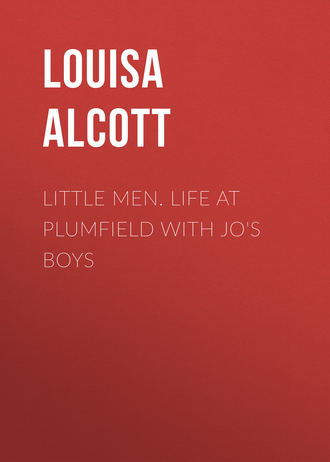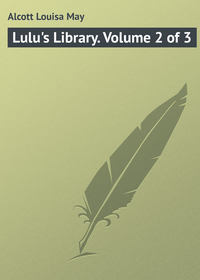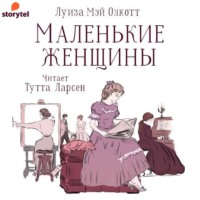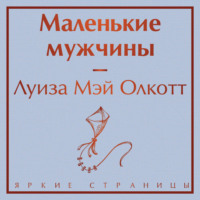 полная версия
полная версияLittle Men. Life at Plumfield with Jo's Boys
“That’s why we made them for you,” cried Tommy, standing on his head as the most appropriate way of expressing his emotions.
“Let us fly them,” said energetic Nan.
“I don’t know how,” began Daisy.
“We’ll show you, we want to!” cried all the boys in a burst of devotion, as Demi took Daisy’s, Tommy Nan’s, and Nat, with difficulty, persuaded Bess to let go her little blue one.
“Aunty, if you will wait a minute, we’ll pitch yours for you,” said Demi, feeling that Mrs. Bhaer’s favor must not be lost again by any neglect of theirs.
“Bless your buttons, dear, I know all about it; and here is a boy who will toss up for me,” added Mrs. Jo, as the professor peeped over the rock with a face full of fun.
He came out at once, tossed up the big kite, and Mrs. Jo ran off with it in fine style, while the children stood and enjoyed the spectacle. One by one all the kites went up, and floated far overhead like gay birds, balancing themselves on the fresh breeze that blew steadily over the hill. Such a merry time as they had! running and shouting, sending up the kites or pulling them down, watching their antics in the air, and feeling them tug at the string like live creatures trying to escape. Nan was quite wild with the fun, Daisy thought the new play nearly as interesting as dolls, and little Bess was so fond of her “boo tite,” that she would only let it go on very short flights, preferring to hold it in her lap and look at the remarkable pictures painted on it by Tommy’s dashing brush. Mrs. Jo enjoyed hers immensely, and it acted as if it knew who owned it, for it came tumbling down head first when least expected, caught on trees, nearly pitched into the river, and finally darted away to such a height that it looked a mere speck among the clouds.
By and by every one got tired, and fastening the kite-strings to trees and fences, all sat down to rest, except Mr. Bhaer, who went off to look at the cows, with Teddy on his shoulder.
“Did you ever have such a good time as this before?” asked Nat, as they lay about on the grass, nibbling pennyroyal like a flock of sheep.
“Not since I last flew a kite, years ago, when I was a girl,” answered Mrs. Jo.
“I’d like to have known you when you were a girl, you must have been so jolly,” said Nat.
“I was a naughty little girl, I am sorry to say.”
“I like naughty little girls,” observed Tommy, looking at Nan, who made a frightful grimace at him in return for the compliment.
“Why don’t I remember you then, Aunty? Was I too young?” asked Demi.
“Rather, dear.”
“I suppose my memory hadn’t come then. Grandpa says that different parts of the mind unfold as we grow up, and the memory part of my mind hadn’t unfolded when you were little, so I can’t remember how you looked,” explained Demi.
“Now, little Socrates, you had better keep that question for grandpa, it is beyond me,” said Aunt Jo, putting on the extinguisher.
“Well, I will, he knows about those things, and you don’t,” returned Demi, feeling that on the whole kites were better adapted to the comprehension of the present company.
“Tell about the last time you flew a kite,” said Nat, for Mrs. Jo had laughed as she spoke of it, and he thought it might be interesting.
“Oh, it was only rather funny, for I was a great girl of fifteen, and was ashamed to be seen at such a play. So Uncle Teddy and I privately made our kites, and stole away to fly them. We had a capital time, and were resting as we are now, when suddenly we heard voices, and saw a party of young ladies and gentlemen coming back from a picnic. Teddy did not mind, though he was rather a large boy to be playing with a kite, but I was in a great flurry, for I knew I should be sadly laughed at, and never hear the last of it, because my wild ways amused the neighbors as much as Nan’s do us.
“‘What shall I do?’ I whispered to Teddy, as the voices drew nearer and nearer.
“‘I’ll show you,’ he said, and whipping out his knife he cut the strings. Away flew the kites, and when the people came up we were picking flowers as properly as you please. They never suspected us, and we had a grand laugh over our narrow escape.”
“Were the kites lost, Aunty?” asked Daisy.
“Quite lost, but I did not care, for I made up my mind that it would be best to wait till I was an old lady before I played with kites again; and you see I have waited,” said Mrs. Jo, beginning to pull in the big kite, for it was getting late.
“Must we go now?”
“I must, or you won’t have any supper; and that sort of surprise party would not suit you, I think, my chickens.”
“Hasn’t our party been a nice one?” asked Tommy, complacently.
“Splendid!” answered every one.
“Do you know why? It is because your guests have behaved themselves, and tried to make every thing go well. You understand what I mean, don’t you?”
“Yes’m,” was all the boys said, but they stole a shamefaced look at one another, as they meekly shouldered their kites and walked home, thinking of another party where the guests had not behaved themselves, and things had gone badly on account of it.
CHAPTER X
HOME AGAIN
July had come, and haying begun; the little gardens were doing finely, and the long summer days were full of pleasant hours. The house stood open from morning till night, and the lads lived out of doors, except at school time. The lessons were short, and there were many holidays, for the Bhaers believed in cultivating healthy bodies by much exercise, and our short summers are best used in out-of-door work. Such a rosy, sunburnt, hearty set as the boys became; such appetites as they had; such sturdy arms and legs, as outgrew jackets and trousers; such laughing and racing all over the place; such antics in house and barn; such adventures in the tramps over hill and dale; and such satisfaction in the hearts of the worthy Bhaers, as they saw their flock prospering in mind and body, I cannot begin to describe. Only one thing was needed to make them quite happy, and it came when they least expected it.
One balmy night when the little lads were in bed, the elder ones bathing down at the brook, and Mrs. Bhaer undressing Teddy in her parlor, he suddenly cried out, “Oh, my Danny!” and pointed to the window, where the moon shone brightly.
“No, lovey, he is not there, it was the pretty moon,” said his mother.
“No, no, Danny at a window; Teddy saw him,” persisted baby, much excited.
“It might have been,” and Mrs. Bhaer hurried to the window, hoping it would prove true. But the face was gone, and nowhere appeared any signs of a mortal boy; she called his name, ran to the front door with Teddy in his little shirt, and made him call too, thinking the baby voice might have more effect than her own. No one answered, nothing appeared, and they went back much disappointed. Teddy would not be satisfied with the moon, and after he was in his crib kept popping up his head to ask if Danny was not “tummin’ soon.”
By and by he fell asleep, the lads trooped up to bed, the house grew still, and nothing but the chirp of the crickets broke the soft silence of the summer night. Mrs. Bhaer sat sewing, for the big basket was always piled with socks, full of portentous holes, and thinking of the lost boy. She had decided that baby had been mistaken, and did not even disturb Mr. Bhaer by telling him of the child’s fancy, for the poor man got little time to himself till the boys were abed, and he was busy writing letters. It was past ten when she rose to shut up the house. As she paused a minute to enjoy the lovely scene from the steps, something white caught her eye on one of the hay-cocks scattered over the lawn. The children had been playing there all the afternoon, and, fancying that Nan had left her hat as usual, Mrs. Bhaer went out to get it. But as she approached, she saw that it was neither hat nor handkerchief, but a shirt sleeve with a brown hand sticking out of it. She hurried round the hay-cock, and there lay Dan, fast asleep.
Ragged, dirty, thin, and worn-out he looked; one foot was bare, the other tied up in the old gingham jacket which he had taken from his own back to use as a clumsy bandage for some hurt. He seemed to have hidden himself behind the hay-cock, but in his sleep had thrown out the arm that had betrayed him. He sighed and muttered as if his dreams disturbed him, and once when he moved, he groaned as if in pain, but still slept on quite spent with weariness.
“He must not lie here,” said Mrs. Bhaer, and stooping over him she gently called his name. He opened his eyes and looked at her, as if she was a part of his dream, for he smiled and said drowsily, “Mother Bhaer, I’ve come home.”
The look, the words, touched her very much, and she put her hand under his head to lift him up, saying in her cordial way, —
“I thought you would, and I’m so glad to see you, Dan.” He seemed to wake thoroughly then, and started up looking about him as if he suddenly remembered where he was, and doubted even that kind welcome. His face changed, and he said in his old rough way, —
“I was going off in the morning. I only stopped to peek in, as I went by.”
“But why not come in, Dan? Didn’t you hear us call you? Teddy saw, and cried for you.”
“Didn’t suppose you’d let me in,” he said, fumbling with a little bundle which he had taken up as if going immediately.
“Try and see,” was all Mrs. Bhaer answered, holding out her hand and pointing to the door, where the light shone hospitably.
With a long breath, as if a load was off his mind, Dan took up a stout stick, and began to limp towards the house, but stopped suddenly, to say inquiringly, —
“Mr. Bhaer won’t like it. I ran away from Page.”
“He knows it, and was sorry, but it will make no difference. Are you lame?” asked Mrs. Jo, as he limped on again.
“Getting over a wall a stone fell on my foot and smashed it. I don’t mind,” and he did his best to hide the pain each step cost him.
Mrs. Bhaer helped him into her own room, and, once there, he dropped into a chair, and laid his head back, white and faint with weariness and suffering.
“My poor Dan! drink this, and then eat a little; you are at home now, and Mother Bhaer will take good care of you.”
He only looked up at her with eyes full of gratitude, as he drank the wine she held to his lips, and then began slowly to eat the food she brought him. Each mouthful seemed to put heart into him, and presently he began to talk as if anxious to have her know all about him.
“Where have you been, Dan?” she asked, beginning to get out some bandages.
“I ran off more’n a month ago. Page was good enough, but too strict. I didn’t like it, so I cut away down the river with a man who was going in his boat. That’s why they couldn’t tell where I’d gone. When I left the man, I worked for a couple of weeks with a farmer, but I thrashed his boy, and then the old man thrashed me, and I ran off again and walked here.”
“All the way?”
“Yes, the man didn’t pay me, and I wouldn’t ask for it. Took it out in beating the boy,” and Dan laughed, yet looked ashamed, as he glanced at his ragged clothes and dirty hands.
“How did you live? It was a long, long tramp for a boy like you.”
“Oh, I got on well enough, till I hurt my foot. Folks gave me things to eat, and I slept in barns and tramped by day. I got lost trying to make a short cut, or I’d have been here sooner.”
“But if you did not mean to come in and stay with us, what were you going to do?”
“I thought I’d like to see Teddy again, and you; and then I was going back to my old work in the city, only I was so tired I went to sleep on the hay. I’d have been gone in the morning, if you hadn’t found me.”
“Are you sorry I did?” and Mrs. Jo looked at him with a half merry, half reproachful look, as she knelt down to look at his wounded foot.
The color came up into Dan’s face, and he kept his eyes fixed on his plate, as he said very low, “No, ma’am, I’m glad, I wanted to stay, but I was afraid you – ”
He did not finish, for Mrs. Bhaer interrupted him by an exclamation of pity, as she saw his foot, for it was seriously hurt.
“When did you do it?”
“Three days ago.”
“And you have walked on it in this state?”
“I had a stick, and I washed it at every brook I came to, and one woman gave me a rag to put on it.”
“Mr. Bhaer must see and dress it at once,” and Mrs. Jo hastened into the next room, leaving the door ajar behind her, so that Dan heard all that passed.
“Fritz, that boy has come back.”
“Who? Dan?”
“Yes, Teddy saw him at the window, and we called to him, but he went away and hid behind the hay-cocks on the lawn. I found him there just now fast asleep, and half dead with weariness and pain. He ran away from Page a month ago, and has been making his way to us ever since. He pretends that he did not mean to let us see him, but go on to the city, and his old work, after a look at us. It is evident, however, that the hope of being taken in has led him here through every thing, and there he is waiting to know if you will forgive and take him back.”
“Did he say so?”
“His eyes did, and when I waked him, he said, like a lost child, ‘Mother Bhaer, I’ve come home.’ I hadn’t the heart to scold him, and just took him in like a poor little black sheep come back to the fold. I may keep him, Fritz?”
“Of course you may! This proves to me that we have a hold on the boy’s heart, and I would no more send him away now than I would my own Rob.”
Dan heard a soft little sound, as if Mrs. Jo thanked her husband without words, and, in the instant’s silence that followed, two great tears that had slowly gathered in the boy’s eyes brimmed over and rolled down his dusty cheeks. No one saw them, for he brushed them hastily away; but in that little pause I think Dan’s old distrust for these good people vanished for ever, the soft spot in his heart was touched, and he felt an impetuous desire to prove himself worthy of the love and pity that was so patient and forgiving. He said nothing, he only wished the wish with all his might, resolved to try in his blind boyish way, and sealed his resolution with the tears which neither pain, fatigue, nor loneliness could wring from him.
“Come and see his foot. I am afraid it is badly hurt, for he has kept on three days through heat and dust, with nothing but water and an old jacket to bind it up with. I tell you, Fritz, that boy is a brave lad, and will make a fine man yet.”
“I hope so, for your sake, enthusiastic woman, your faith deserves success. Now, I will go and see your little Spartan. Where is he?”
“In my room; but, dear, you’ll be very kind to him, no matter how gruff he seems. I am sure that is the way to conquer him. He won’t bear sternness nor much restraint, but a soft word and infinite patience will lead him as it used to lead me.”
“As if you ever were like this little rascal!” cried Mr. Bhaer, laughing, yet half angry at the idea.
“I was in spirit, though I showed it in a different way. I seem to know by instinct how he feels, to understand what will win and touch him, and to sympathize with his temptations and faults. I am glad I do, for it will help me to help him; and if I can make a good man of this wild boy, it will be the best work of my life.”
“God bless the work, and help the worker!”
Mr. Bhaer spoke now as earnestly as she had done, and both came in together to find Dan’s head down upon his arm, as if he was quite overcome by sleep. But he looked up quickly, and tried to rise as Mr. Bhaer said pleasantly, —
“So you like Plumfield better than Page’s farm. Well, let us see if we can get on more comfortably this time than we did before.”
“Thanky, sir,” said Dan, trying not to be gruff, and finding it easier than he expected.
“Now, the foot! Ach! – this is not well. We must have Dr. Firth to-morrow. Warm water, Jo, and old linen.”
Mr. Bhaer bathed and bound up the wounded foot, while Mrs. Jo prepared the only empty bed in the house. It was in the little guest-chamber leading from the parlor, and often used when the lads were poorly, for it saved Mrs. Jo from running up and down, and the invalids could see what was going on. When it was ready, Mr. Bhaer took the boy in his arms, and carried him in, helped him undress, laid him on the little white bed, and left him with another hand-shake, and a fatherly “Good-night, my son.”
Dan dropped asleep at once, and slept heavily for several hours; then his foot began to throb and ache, and he awoke to toss about uneasily, trying not to groan lest any one should hear him, for he was a brave lad, and did bear pain like “a little Spartan,” as Mr. Bhaer called him.
Mrs. Jo had a way of flitting about the house at night, to shut the windows if the wind grew chilly, to draw mosquito curtains over Teddy, or look after Tommy, who occasionally walked in his sleep. The least noise waked her, and as she often heard imaginary robbers, cats, and conflagrations, the doors stood open all about, so her quick ear caught the sound of Dan’s little moans, and she was up in a minute. He was just giving his hot pillow a despairing thump when a light came glimmering through the hall, and Mrs. Jo crept in, looking like a droll ghost, with her hair in a great knob on the top of her head, and a long gray dressing-gown trailing behind her.
“Are you in pain, Dan?”
“It’s pretty bad; but I didn’t mean to wake you.”
“I’m a sort of owl, always flying about at night. Yes, your foot is like fire; the bandages must be wet again,” and away flapped the maternal owl for more cooling stuff, and a great mug of ice water.
“Oh, that’s so nice!” sighed Dan, as the wet bandages went on again, and a long draught of water cooled his thirsty throat.
“There, now, sleep your best, and don’t be frightened if you see me again, for I’ll slip down by and by, and give you another sprinkle.”
As she spoke, Mrs. Jo stooped to turn the pillow and smooth the bed-clothes, when, to her great surprise, Dan put his arm round her neck, drew her face down to his, and kissed her, with a broken “Thank you, ma’am,” which said more than the most eloquent speech could have done; for the hasty kiss, the muttered words, meant, “I’m sorry, I will try.” She understood it, accepted the unspoken confession, and did not spoil it by any token of surprise. She only remembered that he had no mother, kissed the brown cheek half hidden on the pillow, as if ashamed of that little touch of tenderness, and left him, saying, what he long remembered, “You are my boy now, and if you choose you can make me proud and glad to say so.”
Once again, just at dawn, she stole down to find him so fast asleep that he did not wake, and showed no sign of consciousness as she wet his foot, except that the lines of pain smoothed themselves away, and left his face quite peaceful.
The day was Sunday, and the house so still that he never waked till near noon, and, looking round him, saw an eager little face peering in at the door. He held out his arms, and Teddy tore across the room to cast himself bodily upon the bed, shouting, “My Danny’s tum!” as he hugged and wriggled with delight. Mrs. Bhaer appeared next, bringing breakfast, and never seeming to see how shamefaced Dan looked at the memory of the little scene last night. Teddy insisted on giving him his “betfus,” and fed him like a baby, which, as he was not very hungry, Dan enjoyed very much.
Then came the doctor, and the poor Spartan had a bad time of it, for some of the little bones of his foot were injured, and putting them to rights was such a painful job, that Dan’s lips were white, and great drops stood on his forehead, though he never cried out, and only held Mrs. Jo’s hand so tight that it was red long afterwards.
“You must keep this boy quiet, for a week at least, and not let him put his foot to the ground. By that time, I shall know whether he may hop a little with a crutch, or stick to his bed for a while longer,” said Dr. Firth, putting up the shining instruments that Dan did not like to see.
“It will get well sometime, won’t it?” he asked, looking alarmed at the word “crutches.”
“I hope so;” and with that the doctor departed, leaving Dan much depressed; for the loss of a foot is a dreadful calamity to an active boy.
“Don’t be troubled, I am a famous nurse, and we will have you tramping about as well as ever in a month,” said Mrs. Jo, taking a hopeful view of the case.
But the fear of being lame haunted Dan, and even Teddy’s caresses did not cheer him; so Mrs. Jo proposed that one or two of the boys should come in and pay him a little visit, and asked whom he would like to see.
“Nat and Demi; I’d like my hat too, there’s something in it I guess they’d like to see. I suppose you threw away my bundle of plunder?” said Dan, looking rather anxious as he put the question.
“No, I kept it, for I thought they must be treasures of some kind, you took such care of them;” and Mrs. Jo brought him his old straw hat stuck full of butterflies and beetles, and a handkerchief containing a collection of odd things picked up on his way: birds’ eggs, carefully done up in moss, curious shells and stones, bits of fungus, and several little crabs, in a state of great indignation at their imprisonment.
“Could I have something to put these fellers in? Mr. Hyde and I found ’em, and they are first-rate ones, so I’d like to keep and watch’em; can I?” asked Dan, forgetting his foot, and laughing to see the crabs go sidling and backing over the bed.
“Of course you can; Polly’s old cage will be just the thing. Don’t let them nip Teddy’s toes while I get it;” and away went Mrs. Jo, leaving Dan overjoyed to find that his treasures were not considered rubbish, and thrown away.
Nat, Demi, and the cage arrived together, and the crabs were settled in their new house, to the great delight of the boys, who, in the excitement of the performance, forgot any awkwardness they might otherwise have felt in greeting the runaway. To these admiring listeners Dan related his adventures much more fully than he had done to the Bhaers. Then he displayed his “plunder,” and described each article so well, that Mrs. Jo, who had retired to the next room to leave them free, was surprised and interested, as well as amused, at their boyish chatter.
“How much the lad knows of these things! how absorbed he is in them! and what a mercy it is just now, for he cares so little for books, it would be hard to amuse him while he is laid up; but the boys can supply him with beetles and stones to any extent, and I am glad to find out this taste of his; it is a good one, and may perhaps prove the making of him. If he should turn out a great naturalist, and Nat a musician, I should have cause to be proud of this year’s work;” and Mrs. Jo sat smiling over her book as she built castles in the air, just as she used to do when a girl, only then they were for herself, and now they were for other people, which is the reason perhaps that some of them came to pass in reality – for charity is an excellent foundation to build anything upon.
Nat was most interested in the adventures, but Demi enjoyed the beetles and butterflies immensely, drinking in the history of their changeful little lives as if it were a new and lovely sort of fairy tale – for, even in his plain way, Dan told it well, and found great satisfaction in the thought that here at least the small philosopher could learn of him. So interested were they in the account of catching a musk rat, whose skin was among the treasures, that Mr. Bhaer had to come himself to tell Nat and Demi it was time for the walk. Dan looked so wistfully after them as they ran off, that Father Bhaer proposed carrying him to the sofa in the parlor for a little change of air and scene.
When he was established, and the house quiet, Mrs. Jo, who sat near by showing Teddy pictures, said, in an interested tone, as she nodded towards the treasures still in Dan’s hands, —
“Where did you learn so much about these things?”
“I always liked ’em, but didn’t know much till Mr. Hyde told me.”
“Who was Mr. Hyde?”
“Oh, he was a man who lived round in the woods studying these things – I don’t know what you call him – and wrote about frogs, and fishes, and so on. He stayed at Page’s, and used to want me to go and help him, and it was great fun, ’cause he told me ever so much, and was uncommon jolly and wise. Hope I’ll see him again sometime.”
“I hope you will,” said Mrs. Jo, for Dan’s face had brightened up, and he was so interested in the matter that he forgot his usual taciturnity.











